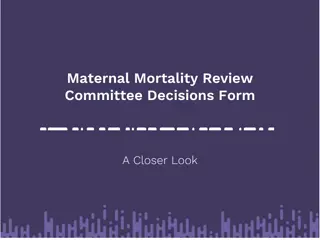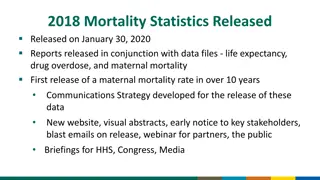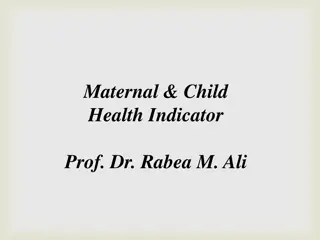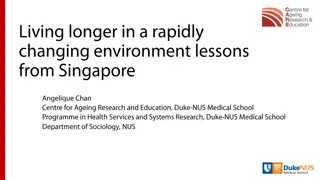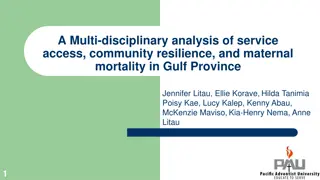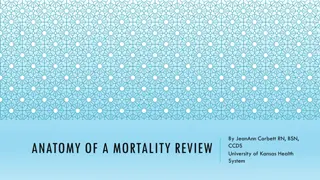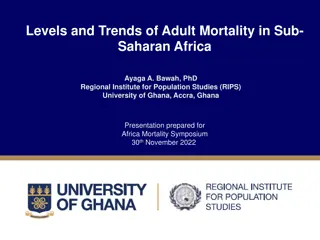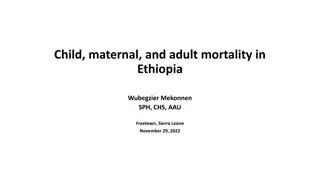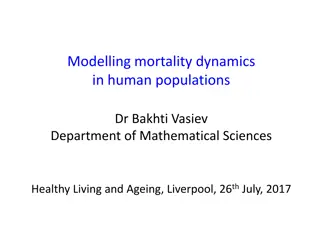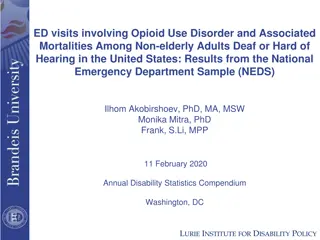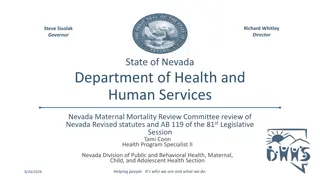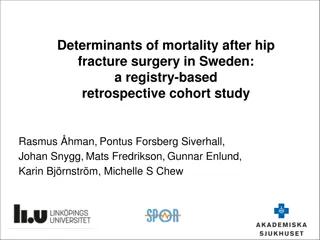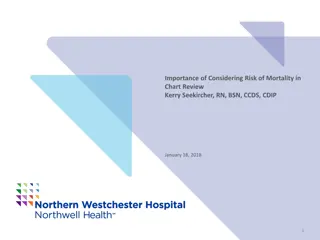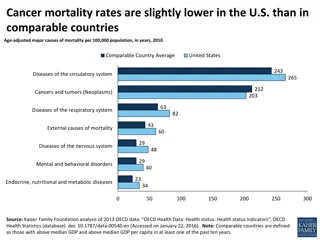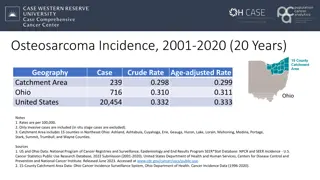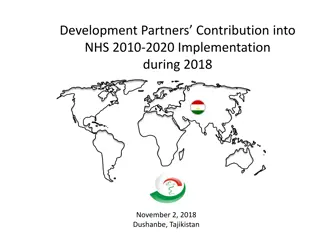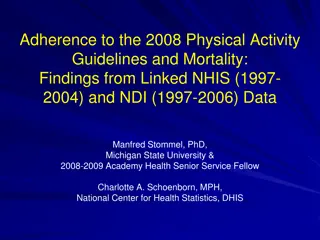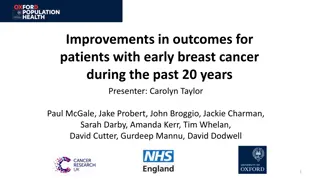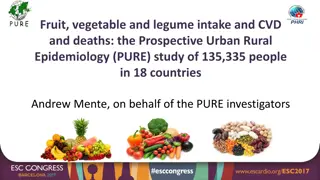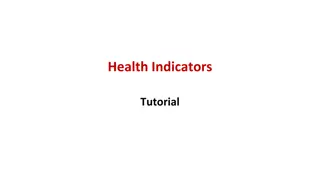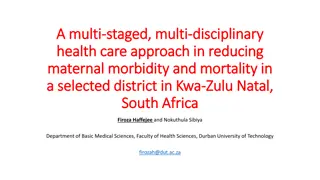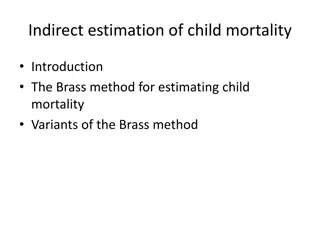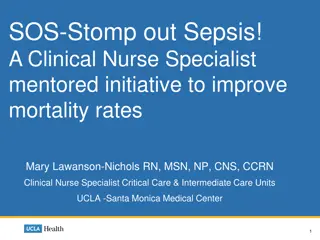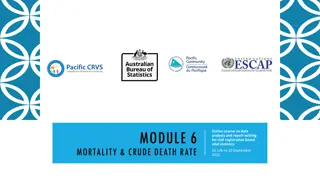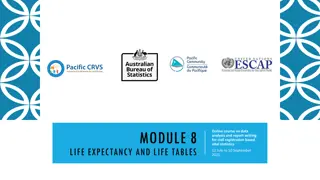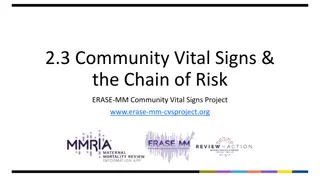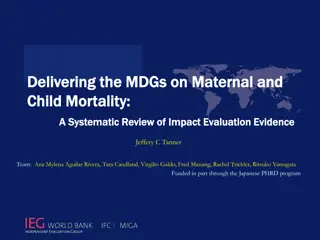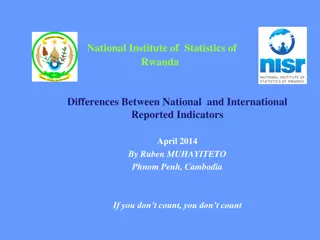Insights on Infant Mortality and Safe Sleep Practices in Illinois
Exploring the definitions of infant mortality and safe sleep practices, this content delves into the Infant Mortality Ratio (IMR) and Sudden Unexpected Infant Death (SUID) Mortality Ratio. Data sources such as vital records and the Pregnancy Risk Assessment Monitoring System (PRAMS) shed light on th
0 views • 57 slides
Advances in Invasive Candidiasis Management: Insights from the 32nd National Congress in Hammamet
The 32nd National Congress discussed important aspects of invasive candidiasis, including diagnosis, treatment, and mortality rates. Key points included clinical presentations, treatment strategies, and mortality correlations with underlying conditions and time to treatment initiation. Various recom
6 views • 29 slides
Strengthening Mortality Surveillance in Tanzania: The SAVVY Experience
This presentation discusses the SAVVY study conducted in Tanzania to improve mortality surveillance using the SAmple Vital events registration with Verbal autopSY approach. It addresses the challenges of capturing death events in a diverse population with limited vital statistics systems. The study
4 views • 22 slides
Maternal Mortality Crisis in the U.S.: Urgent Need for Healthcare Reform
Maternal mortality rates in the United States have significantly increased over the years, with racial disparities exacerbating the issue. The data shows a concerning rise in both maternal and infant mortality, highlighting the critical need for comprehensive healthcare reform to address these alarm
4 views • 25 slides
Recent Trends in Mortality and Life Expectancy in the United States
Recent studies highlight a concerning trend of stalling and declining life expectancy in the United States, particularly attributed to an increase in mortality among middle-aged and younger adults. The research focuses on understanding the impact of post-2010 mortality trends on different age groups
0 views • 15 slides
Maternal Mortality Review Committee Decisions Form Overview
This article provides an in-depth look at the Maternal Mortality Review Committee Decisions Form, highlighting its purpose, data collection process, and key considerations. It emphasizes the importance of accurate documentation and analysis in maternal mortality cases, guiding committees on how to c
0 views • 28 slides
2018 Mortality Statistics: Life Expectancy, Drug Overdose, Maternal Mortality Released
Mortality statistics for 2018 were released on January 30, 2020, highlighting life expectancy trends, drug overdose statistics, and the first maternal mortality rate in over a decade. A comprehensive communications strategy was executed to disseminate the data, including a new website, visual abstra
0 views • 9 slides
Maternal and Child Health Indicators: Objectives and Mortality Rates
Maternal and Child Health (MCH) services aim for the reduction of maternal, perinatal, infant, and childhood mortality and morbidity, promotion of reproductive health, and physical and psychological development of children and adolescents within families. The indicators focus on mortality rates, inc
0 views • 31 slides
Impact of COVID-19 on Statistics, Public Health, Mortality, Social, and Economic Aspects in the Netherlands
The COVID-19 pandemic has significantly affected various aspects in the Netherlands, including statistics, public health, mortality rates, social impacts, and the economy. The impact ranges from increased mortality rates to changes in labor participation, job losses, unemployment, and economic insta
0 views • 13 slides
The Impact of Loneliness on Health and Mortality Among Aging Populations
Loneliness in older adults is a significant concern that can have detrimental effects on health and mortality rates. Research shows that social relationships play a crucial role in shaping health outcomes, with loneliness being comparable to well-known risk factors like smoking and high blood pressu
0 views • 38 slides
Understanding Mark-Recapture Methods for Estimating Population Abundance
This content explores the concept of estimating population abundance using mark-recapture methods. It covers various aspects such as natural mortality, recruitment, fishing mortality, immigration, and emigration. The process involves marking animals in one sample, allowing them to integrate back int
0 views • 29 slides
A Multi-disciplinary Analysis of Service Access, Community Resilience, and Maternal Mortality in Gulf Province
This paper presents a comprehensive analysis focusing on service access, community resilience, and maternal mortality in Gulf Province, Papua New Guinea. It highlights the importance of improving referral systems for maternal health in remote communities and discusses the preliminary findings from a
1 views • 53 slides
Understanding Mortality Reviews and Their Impact on Quality of Care
Mortality reviews play a vital role in assessing the quality of care provided by healthcare facilities. By analyzing observed versus expected mortality rates, healthcare organizations can identify areas for improvement and enhance patient outcomes. The APR-DRG system, including Severity of Illness a
0 views • 17 slides
Analyzing Adult Mortality Trends in Sub-Saharan Africa
Adult mortality trends in Sub-Saharan Africa have been historically underrepresented compared to child mortality. This presentation by Ayaga A. Bawah explores the levels and patterns of adult mortality using data from Health and Demographic Surveillance Systems (HDSS) sites in the region. The method
5 views • 17 slides
Child, Maternal, and Adult Mortality in Ethiopia: A Study on Age-Cause-Specific Mortality Distribution
The study focuses on the mortality rates in Ethiopia, highlighting the challenges in rural areas and the high maternal mortality. It discusses the implementation of CRVS and the use of VAs to identify causes of death, particularly in rural regions. The objectives include analyzing age-cause-specific
0 views • 25 slides
Mortality Aggregation Examples at NAIC National Meeting
In August 2019, key concepts for mortality aggregation were discussed at the NAIC National Meeting. The examples presented covered approaches under VM-20 language, emphasizing the importance of informed mortality segment assumptions through credible aggregation methods.
0 views • 21 slides
Mortality Dynamics in Human Populations: Modeling Trends and Patterns
Explore the dynamics of mortality in human populations through concepts like Gompertz Law, Compensation Effect, and Late-life Deceleration. Discover how mathematical models help analyze mortality data, predict future trends, and guide research for healthier aging.
0 views • 17 slides
Opioid Use Disorder and Mortality Among Non-elderly Deaf/Hard of Hearing Adults in the US
This study examined the risk of opioid use disorder (OUD) related emergency department (ED) visits and mortality among non-elderly adults who are deaf or hard of hearing (DHH) in the United States. Using data from the National Emergency Department Sample (NEDS), researchers found significant associa
0 views • 21 slides
Understanding Maternal Mortality: Nevada's Review and Regulations
Exploring the Maternal Mortality Review Committee in Nevada, the definitions of maternal mortality, the responsibilities of MMRCs, and Nevada's Revised Statutes related to maternal mortality. Learn about the efforts to prevent future deaths and improve the review process.
0 views • 21 slides
Determinants of Mortality After Hip Fracture Surgery in Sweden: A Registry-Based Retrospective Cohort Study
Hip fractures in Sweden pose significant challenges due to increased mortality rates. A retrospective cohort study analyzed data from the Swedish PeriOperative Registry to identify factors influencing patient outcomes post-surgery, highlighting the importance of various perioperative variables on lo
0 views • 32 slides
Understanding the Importance of Mortality Risk in Chart Review
The presentation by Kerry Seekircher highlights the significance of considering the risk of mortality in chart reviews. It covers the benefits of conducting a mortality review, emphasizes the need for accurate documentation and coding of diagnoses, and explains the concept of risk-adjusted mortality
0 views • 50 slides
Cancer Mortality Rates and Spending Insights
Cancer mortality rates in the U.S. are slightly lower compared to other countries, with circulatory diseases and cancers being major causes of mortality. Lung cancer is a significant contributor to disease burden, especially among males. Despite cancer accounting for 7% of health expenditures, it wa
0 views • 6 slides
Osteosarcoma Incidence and Mortality in Ohio, 2001-2020: Data Analysis
Examination of osteosarcoma incidence and mortality rates over two decades in Ohio's 15-county catchment area reveals a crude rate of 0.298-0.333 for incidence and 0.142-0.179 for mortality per 100,000. Data sources include SEER databases, highlighting the challenges in identifying osteosarcoma case
0 views • 9 slides
Development Partners Contribution into NHS 2010-2020: Impact and Indicators
This report discusses the contribution of development partners into the National Health Strategy 2010-2020, focusing on key impact indicators such as government health expenditure, maternal mortality ratio, road traffic mortality rate, and mortality ratio attributed to air pollution. It presents dat
0 views • 24 slides
Adherence to 2008 Physical Activity Guidelines & Mortality Study
This study explores the association between adherence to the 2008 Physical Activity Guidelines for Americans and all-cause mortality. It analyzes data from the NHIS and NDI to assess the risks associated with aerobic and muscle-strengthening activities. The primary objective is to evaluate mortality
0 views • 29 slides
Alleviating Misconceptions About Energy: Wildlife Impacts, Bird Mortality, Human Health, and Shadow Flicker
These slides address common misconceptions about energy, focusing on wildlife impacts, bird mortality from wind turbines, human health effects, and shadow flicker concerns. They highlight strategies to reduce wildlife impacts, comparisons of bird mortality with other structures, lack of evidence for
0 views • 9 slides
Snake Bite Epidemiology and Mortality in India
Snake bites pose a significant public health challenge in India, with a high incidence of deaths especially in rural regions. Lack of reliable national data hinders accurate assessment of the problem. The major venomous snakes contributing to fatalities include species from the families Elapidae and
0 views • 32 slides
Improvements in Outcomes for Patients with Early Breast Cancer Over the Past 20 Years
Presenter Carolyn Taylor and team present data on improvements in outcomes for women with early breast cancer from 1993 to 2015 in England. The study highlights patient and tumor factors, breast cancer mortality rates, long-term follow-up data, and the need for big data analysis. The research focuse
0 views • 18 slides
Association of Fruit, Vegetable, and Legume Intake with Cardiovascular Disease and Mortality
The study conducted by the PURE investigators examined the relationship between fruit, vegetable, and legume consumption and cardiovascular disease (CVD) and mortality in a cohort of 135,335 individuals from 18 countries. Dietary guidelines recommend at least 5 daily servings of these foods, which h
0 views • 27 slides
Understanding Health Indicators: Calculating Mortality Rates in Communities
Learn how to calculate various mortality rates—such as crude mortality rate, proportionate mortality, case fatality rate, and cause-specific mortality rate—using real-life scenarios from communities like Adias and Wales. Understand the significance of these rates in assessing public health outco
0 views • 16 slides
Addressing Maternal Morbidity and Mortality in KwaZulu-Natal, South Africa: A Multi-Staged Approach
This study focuses on reducing maternal morbidity and mortality rates in KwaZulu-Natal, South Africa, which remain unacceptably high. The research by Firoza Haffejee and Nokuthula Sibiya highlights the need for a comprehensive, multi-disciplinary healthcare strategy to tackle the various factors con
0 views • 31 slides
Exploring Indirect Estimation Methods for Child Mortality
Delve into the Brass method and variants for estimating child mortality, utilizing indirect estimation methods through birth histories and data correction. Discover how analyzing birth histories and applying model life tables aid in estimating mortality trends.
0 views • 16 slides
Improving Mortality Rates in Sepsis Patients: A Clinical Nurse Specialist Initiative
Clinical Nurse Specialist, Mary Lawanson-Nichols, initiated a program at UCLA-Santa Monica Medical Center to reduce mortality rates in sepsis patients. By focusing on mentoring skills, leadership development for staff nurses, and examining influences on mortality, the program aims to make a signific
0 views • 24 slides
Are Mobile Phone Surveys an Alternative to Face-to-Face Interviews in Crisis Settings? A National Study in Burkina Faso
Vital registration data source completeness remains low in many countries, prompting the exploration of alternative data collection methods like mobile phone surveys (MPS). MPS have advantages such as cost-effectiveness and quick deployment but face challenges like network quality. This study in Bur
0 views • 13 slides
Understanding Sub-Saharan Africa's Mortality Trajectory: Past, Present, and Future Prospects
Explore the mortality trends in Sub-Saharan Africa, focusing on infant and child mortality as well as adult mortality. Despite significant progress, challenges persist due to uneven gains globally. Child mortality has seen a substantial decline, but rates remain high. Public health interventions hav
0 views • 24 slides
Importance of Mortality Data in Health Outcomes Analysis
Mortality data serves as a crucial indicator of quality of life and health outcomes. It helps assess the level of health in a population by understanding factors such as age at death, comparison to global norms, and trends over time. This data is vital for population health planning, resource alloca
0 views • 27 slides
Understanding Life Tables: Essential Tools in Demographic Analysis
Life tables are crucial tools in demography for analyzing mortality patterns and calculating life expectancy. They summarize mortality experiences of cohorts, provide insights on survival probabilities, and help estimate life expectancies for different populations. By constructing cohort and period
0 views • 31 slides
Understanding Community Vital Signs and Maternal Mortality Review Committee Findings
Explore the importance of Community Vital Signs and Maternal Mortality Review Committee in assessing pregnancy-related deaths. Learn about the factors contributing to these deaths, preventive measures, and anticipated impacts of addressing contributing factors. Delve into chains of risk, like morbid
0 views • 20 slides
Impact Evaluation of Interventions for Maternal and Child Mortality
This systematic review evaluates the impact of interventions on reducing maternal and child mortality rates, focusing on skilled birth attendance. It aims to identify effective strategies, gaps in knowledge, and outcomes related to maternal and child health outcomes. The conceptual model outlines in
0 views • 29 slides
Analysis of Maternal and Infant Mortality Rates in Rwanda
The analysis explores the differences between national and international reported indicators such as Maternal Mortality Ratio, Infant Mortality Rate, and Antenatal Care Coverage in Rwanda. It discusses challenges in data collection, potential underreporting, and misclassification affecting maternal
0 views • 8 slides





